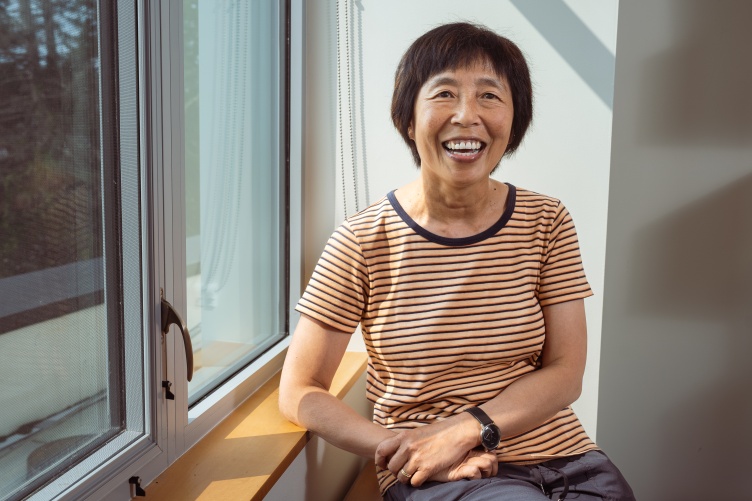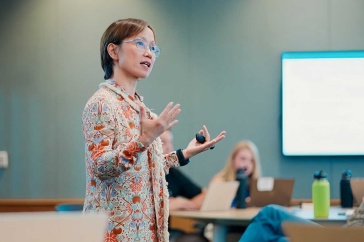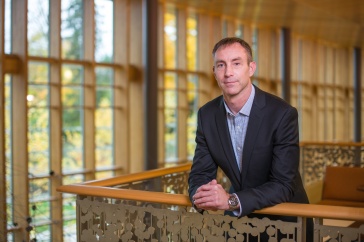
Ju-Chin Huang, a professor of economics at UNH Peter T. Paul College of Business and Economics, was recently honored with the 2023 UNH Sustainability Institute Lifetime Achievement Award.
As the recipient of the 2023 UNH Sustainability Institute Lifetime Achievement Award, Ju-Chin Huang was initially unsure what to think.
“It’s funny because this a lifetime achievement award, so it feels like it’s time to retire,” Huang jokingly remarked. “But of course, I was honored to receive the award, it’s a very nice recognition.”
Huang, a professor of economics at UNH Peter T. Paul College of Business and Economics, is described as a pioneer in non-market valuation. Her work includes economic valuation of environmental/non-public goods — putting a price tag on priceless things.
“You have to look at the benefits and costs to improve the sustainability of the environment, so it’s important to figure out what the benefits are when we want to do something,” Huang says. “When we talk about the environment a lot of things are public goods, it’s not like a private good that you can just purchase from the private market and there’s a price for it.”
Examples of environmental valuation projects that Huang has worked on include the economic benefits of raising national air quality standards and the benefits and costs of beach erosion control. Huang has also done projects with water quality, highway noise, solid waste management and seafood risk perceptions.
Determining the price of a public good involves extensive research through direct and indirect methods. For example, a valuation of improving the water quality at a local beach could include a direct method where Huang puts together a survey to ask people directly what they would be willing to pay to improve water quality.
An indirect method would include collecting economic data to determine if beaches with poorer water quality make less money or get fewer visitors than beaches with better water quality, establishing a cost/benefit analysis, according to Huang.
In nominating Huang for the award, economics professor Robert Mohr noted that Huang’s improved valuation techniques help policymakers direct resources to important environmental and resource problems. As an example, he cited Huang’s current work highlighting the value that recreational users place on access to Plum Island National Seashore, which supports policy decisions on preserving and maintaining this local resource.
Huang says one thing that makes her research particularly engaging is the fact that non-market valuation applies to a wide array of industries, and she gets to work with the brightest minds in science, including ecologists, engineers and geologists.
“I work with a lot of scientists, depending on the nature of the topic, and I really need to rely on them to help me understand things,” she says. “It also means a lot of communication because we all look at things from different aspects. It’s interesting working with people in different disciplines.”
A challenging project that Huang once worked on occurred early in her academic career when she was approached by the co-director of the NOAA-UNH Joint Hydrographic Center about determining the value of a hydrographic survey — a survey of the ocean floor.
Huang said the scope of the project made it a challenge because there are several potential benefits to surveying the ocean floor, including navigation, oil drilling and natural resource tracking, to name a few.
“It’s very expensive to survey the ocean floor, as you can imagine,” Huang says. “They came to me to see if there was a way to come up with a benefit measure to justify their budget. But it’s such a big project, so I could only do one little part of it.”
Huang worked with the Passenger Vessel Association on a case study to determine how much members were willing to pay for the most updated navigational chart information in electronic format, to show value to how updated navigation would benefit boaters.
Some of Huang’s recent collaborations include working with environmental engineers to gauge individual willingness to pay for technology to enable household greywater reuse, which included surveying neighborhoods in Boston and Atlanta, and working with ecologists to determine landowners' willingness to control invasive plants.
Huang says she appreciates the research process and how it can constantly evolve through survey design, statistical methods and data analysis.
“Non-market valuation research is fun. It all comes down to the methodologies, which can be applied to valuing all sorts of non-market goods. There’s always room to further improve the methodologies,” she says. “I still have a few things in mind that I would like to pursue.”
-
Written By:
Aaron Sanborn | Peter T. Paul College of Business and Economics | aaron.sanborn@unh.edu



















































